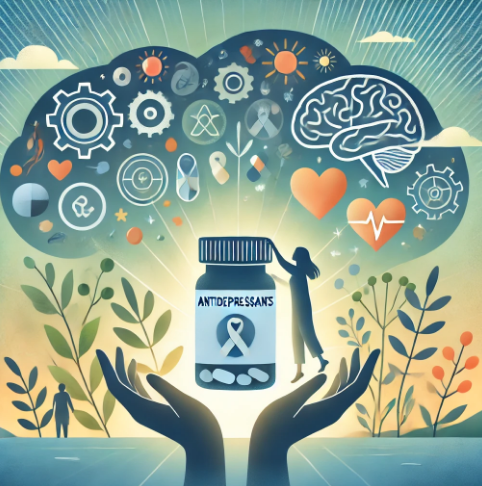Introduction
Antidepressant medications play a pivotal role in mental health recovery, offering relief to individuals struggling with conditions like depression, anxiety disorders, and bipolar disorder. These medications are designed to alter chemical imbalances in the brain, primarily by affecting neurotransmitters such as serotonin, dopamine, and norepinephrine. However, the path to recovery with antidepressants is far from simple or universal; it involves understanding the diverse effects, potential side effects, and individual responses. This article will examine the impact of antidepressants on mental health recovery and their role in a comprehensive treatment approach.
1. Understanding Antidepressants: Types and Functions
Antidepressants are a broad class of medications, each targeting different aspects of brain chemistry. The major types include:
- Selective Serotonin Reuptake Inhibitors (SSRIs): Commonly prescribed for depression and anxiety, SSRIs work by increasing serotonin levels, thus promoting mood stability and well-being.
- Serotonin and Norepinephrine Reuptake Inhibitors (SNRIs): By increasing both serotonin and norepinephrine, SNRIs can be effective for patients with both mood and anxiety disorders.
- Tricyclic Antidepressants (TCAs) and Monoamine Oxidase Inhibitors (MAOIs): These older classes of antidepressants are often reserved for treatment-resistant cases due to their side effect profiles.
2. The Role of Antidepressants in Mental Health Recovery
The use of antidepressants often constitutes one element in a multifaceted recovery process. Mental health recovery encompasses far more than alleviating symptoms; it’s about helping individuals regain a sense of autonomy, stability, and life purpose.
Relieving Symptoms and Stabilizing Mood
Antidepressants work by enhancing neurotransmitter levels, which can alleviate depressive symptoms, reduce anxiety, and improve overall emotional balance. These benefits allow patients to engage in other therapeutic interventions like cognitive-behavioral therapy (CBT) and mindfulness practices, both of which are integral to long-term mental health recovery.
Building Mental Resilience
While antidepressants help to stabilize moods, they are not a cure-all. They can aid in creating a psychological state that fosters resilience, enabling patients to confront underlying issues in a more manageable way. This process can be empowering, often leading individuals to rediscover their strengths and abilities.
3. Challenges in Antidepressant Treatment: Side Effects and Long-term Use
Despite their benefits, antidepressants are not without drawbacks. Many patients experience side effects that can impact their daily lives and overall mental health.
Common Side Effects
Side effects such as nausea, weight gain, sleep disturbances, and sexual dysfunction are common among various types of antidepressants. These effects can sometimes exacerbate feelings of distress, discouraging individuals from continuing their medication.
Dependency and Withdrawal Concerns
Long-term use of antidepressants raises questions about dependency and withdrawal. Some individuals may face significant challenges when attempting to discontinue these medications, experiencing withdrawal symptoms like dizziness, mood swings, and flu-like symptoms.
4. Alternative and Complementary Therapies for Enhanced Recovery
While antidepressants play a central role in many treatment plans, they are often most effective when combined with other forms of therapy.
Cognitive-Behavioral Therapy (CBT)
CBT has proven highly effective for individuals with depression and anxiety. By addressing negative thought patterns, CBT can help patients regain control over their emotions and responses.
Mindfulness and Meditation
Practices like mindfulness meditation can enhance mental clarity, reduce stress, and complement the effects of antidepressants. Research indicates that combining medication with mindfulness can lead to more sustained recovery.
Exercise and Nutrition
Lifestyle modifications, including regular exercise and a balanced diet, can greatly support mental health recovery. Physical activity boosts endorphins and helps improve sleep, while proper nutrition provides essential vitamins and minerals that support brain function.
5. Finding the Right Balance: Individualized Treatment Plans
One of the most critical elements in mental health recovery is the personalization of treatment. No single approach fits all, and different individuals may respond uniquely to various medications or therapeutic approaches. Close communication between patients and healthcare providers is essential in tailoring treatments, managing expectations, and making necessary adjustments.
6. Conclusion: The Path to Lasting Recovery
Antidepressants are an invaluable tool in the mental health recovery journey, providing critical support to individuals grappling with depression and anxiety. However, true recovery involves a combination of medication, therapy, lifestyle changes, and personal resilience. By understanding the limitations and possibilities of antidepressant medications, individuals and healthcare providers can create a balanced, effective plan that promotes mental well-being and recovery.
References
- Schatzberg, Alan F., and Charles B. Nemeroff. The American Psychiatric Publishing Textbook of Psychopharmacology. 5th Edition. American Psychiatric Publishing, 2017.
- Stahl, Stephen M. Stahl’s Essential Psychopharmacology: Neuroscientific Basis and Practical Applications. 4th Edition. Cambridge University Press, 2013.
- Nemeroff, Charles B., and Alan F. Schatzberg. Recognition and Treatment of Depression in Medical Practice. The American Psychiatric Association, 2016.

